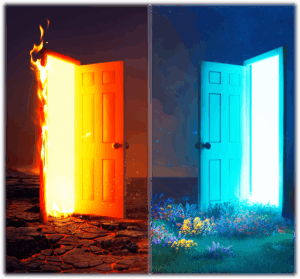A Loving Savior vs Punishment of Hell
Author: Brett Henderson Aug. 24, 2025
First published Zachary Church of Christ Aug. 10, 2025
Categories: Culture, Free Will
First published Zachary Church of Christ Aug. 10, 2025
Categories: Culture, Free Will
 How can God, who is supposed to be all loving, send people to Hell? This might be one of the most common objections to the gospel. It can also be one of the trickier objections to deal with, due to how many incorrect cultural beliefs are held about both Heaven and Hell. When thinking about what Hell is, we often think about the famous medieval paintings and literature such as Dante’s The Divine Comedy (the first part is called Dante’s Inferno). While very artistic, they are not necessarily an accurate depiction of what scripture teaches and often contain influences from pagan cultures. So, the best place to start is usually reverting to scripture and looking at what is actually written about Hell before we deal with the objection itself.
How can God, who is supposed to be all loving, send people to Hell? This might be one of the most common objections to the gospel. It can also be one of the trickier objections to deal with, due to how many incorrect cultural beliefs are held about both Heaven and Hell. When thinking about what Hell is, we often think about the famous medieval paintings and literature such as Dante’s The Divine Comedy (the first part is called Dante’s Inferno). While very artistic, they are not necessarily an accurate depiction of what scripture teaches and often contain influences from pagan cultures. So, the best place to start is usually reverting to scripture and looking at what is actually written about Hell before we deal with the objection itself.There are various descriptions of both Heaven and Hell found in scripture.
Heaven is described as a glorious city with streets of gold (Revelation 21+22)
Hell described as a gloomy darkness (2nd Peter 2:4), place of weeping (Matthew 13:50) and eternal fire (Jude 1:7)
It can be difficult to determine if these are to be taken literally or as descriptors of something on a spiritual plane outside our physical realm. A better approach is to focus on what is clearly illustrated.
Here are five main points to consider:
1. Heaven is eternal fellowship with God. (John 14:1-4)
2. Hell is separation from God. (2nd Thessalonians 1:9)
3. There is no leaving Hell.
4. We seem to retain knowledge of our mortal lives. (Luke16:19-31)
5. Hell was not created for us. (2nd Peter 2:4, Matthew 25:41)
It is also important when speaking about Hell to remember that God does not want any of us to end up there (II Peter 3:8-9). Hell is reserved for those who reject God and is in fact a punishment we bring on ourselves (Romans 2:1-10).
So how do we reconcile having a loving and merciful God with the reality of Hell? We need to remember that God is love (1 John 4:7-12) and remember that God created us in His own image with free will and agency (Genesis 1:26). We cannot know love without freewill for by its very definition love must be freely given. But with us having free will, this means that love cannot be forced. If it is forced, then it is not love. It is also means we have the ability to choose not to love and choose to reject God.
Bill Becker reflected that:
“For where love is forced, it is not really love…God created mankind out of love. And because He created them out of love, He gave them free will. Couldn’t God have forbidden the serpent from coming into the Garden of Eden? Yes, but then man would have never had a choice to make and to exercise free will. If evil was never present, you would never have a chance to make a choice and you would be forced to choose God. But God says ‘I can’t have that. That is not true love. I want a relationship with man, and I want man to want it with me’.1
Additionally, we need to remember that love does not imply that we can do whatever we want. In a marriage, a husband cannot honestly claim to love his wife as he should while actively pursuing another woman. In a similar fashion, accepting God’s love means that we want to live in harmony with His will. Simply put, God loves us, but the ball is in our court to love him back; and if we truly love and desire Him then we will pursue Him.
God loves us so much that he came into our world, took on flesh, and took the punishment that we deserve. In this act God remains perfectly just, loving, and merciful; and provides the free gift of salvation to anyone who would claim it.
So, in the end, Hell becomes much less an issue of “why would a loving God send anyone to Hell?” and much more of a question of why would any rational person chose to reject God’s love and instead choose Hell?
In the words of C.S. Lewis,
“I willingly believe that the damned are, in one sense, successful rebels to the end; and that the gates of Hell are locked from the inside”2
1. Becker, Bill. Faith in Suffering. Delivered Aug. 24, 2025.
2. Lewis, C. S. The Great Divorce. HarperCollins Publishers. London. Feb. 6, 2001
 Brett Henderson holds a B.S. degree in geography from the University of North Alabama, is a geospatial analyst working with LiDAR, and a former US Army Engineer Officer. He is married to Danielle and together they have two children. Brett and his family currently reside in Zachary, LA where he is an active member and teacher within the church there.
Brett Henderson holds a B.S. degree in geography from the University of North Alabama, is a geospatial analyst working with LiDAR, and a former US Army Engineer Officer. He is married to Danielle and together they have two children. Brett and his family currently reside in Zachary, LA where he is an active member and teacher within the church there.